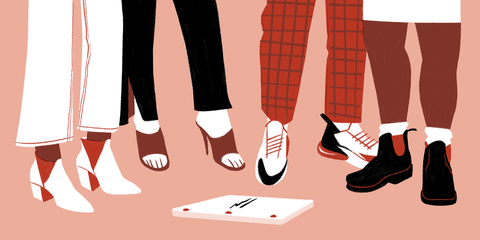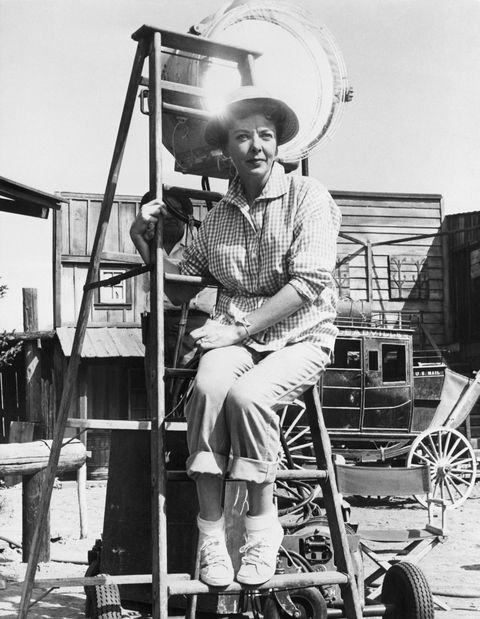It’s hard for me to describe my reaction when I learned last week that Jason Blum, megaproducer of the horror movie empire Blumhouse, told Polygon, “There are not a lot of female directors period, and even less who are inclined to do horror.” I actually think I saw Ida Lupino rise from her grave to give him the coldest, darkest glare imaginable.
I could rattle off a bevy of female horror filmmakers—Mary Harron, Kasi Lemmons, and Ana Lily Amirpour, for starters—whose credits swiftly and easily rebut Blum’s comment. But I won’t, because I’m not a producer whose job it is to scout, nurture, and amplify horror directors. That’s actually what Blum is supposed to be doing.
“He’s upholding the long-held, false belief that horror is a genre only men can stomach.”
Instead, I want to talk about what Blum’s knee-jerk statement, for which he has since apologized, means. When an influential producer like Blum makes a rather convincing declaration that few female directors—of the horror persuasion or otherwise—exist, he proves he hasn’t exposed himself to the wealth of female directorial talent that’s gone disgracefully unrecognized throughout cinematic history. He’s not only denying the existence of these filmmakers, but he’s upholding the long-held, false belief that horror is a genre only men can stomach. Blum even said he tried to court The Babadook director Jennifer Kent for “every film we’ve had available” and she turned him down. So that’s it: Kent said no, and she’s the only woman who can handle horror.
Obviously, that’s not true. And judging by the outpouring of women who have clapped back online about his silly comment (Syfy even offered a list of established female horror directors), Blum should have no problem finding and hiring a woman for his next great horror, since he stated in his mea culpa that this is a “serious” issue he’s “passionate” about.
First of all, this isn’t actually an issue. That’s the point. There are plenty of female directors, and there have always been plenty—some before Blum even came around. (Hi, Doris Wishman, Amy Holden Jones, and Jackie Kong!) They just haven’t been given the platform male directors have. That’s the problem with these so-called statistics and surveys highlighting the gender disparity for filmmakers in Hollywood: They perpetuate the illusion that there are a limited number of women in the game, without acknowledging the fact that male power players like Blum overlook their work, or that the industry often pigeonholes them into making more “female-centric” films that “women audiences” prefer.
Yet even Blum admitted female horror fans make up more than half of Blumhouse’s audience. Take it from Kent herself, who told The Washington Post in 2014, “Women do love watching scary films. It’s been proven, and they’ve done all the tests. The demographics are half men, half women. And we know fear. It’s not like we can’t explore the subject.”
“These films have always been ours. Men just get the privilege to put their names on them.”
In fact, some of the greatest horror movies ever made—Night of the Living Dead, Ju-On: The Grudge, [Rec], Friday the 13th, Get Out, and Halloween (1978)—were directed by men, yet have women at the center of their narratives. What’s more empowering than seeing a woman take down a deranged, male serial killer terrorizing camp counselors? These films have always been ours. Men just get the privilege to put their names on them.
Blum’s comments look even more out of touch when you realize just how ubiquitous female horror filmmakers have become in recent years. Many (though certainly not enough) have found opportunities to put their own stamp on horror narratives, because they see the importance of films that are not only for us, but by us. From modern classics like Eve’s Bayou and Slumber Party Massacre to new entries to the genre like Raw and Prevenge, women directors are establishing their own legacies regardless of whether their male counterparts appreciate them. This isn’t the Golden Age of Hollywood, when Ida Lupino was an anomaly for directing and co-writing 1953’s The Hitch-Hiker. Hopefully, we’ll soon be looking at a more evenly-represented genre that is reflective of its audience. But we need execs like Jason Blum to value the work of female filmmakers, to hire and invest in them, and we need more female-led production houses to recruit other women.
Blum claims he will “do better,” which hopefully means that he 1) uses his platform to cultivate women and other underrepresented filmmakers who deserve to shine and 2) presents Kent with a movie worthy of her talent. Now that he’s put his foot in his mouth, female horror fans like me will be watching his next move very closely. You’re up, Blum.
Source: Read Full Article

